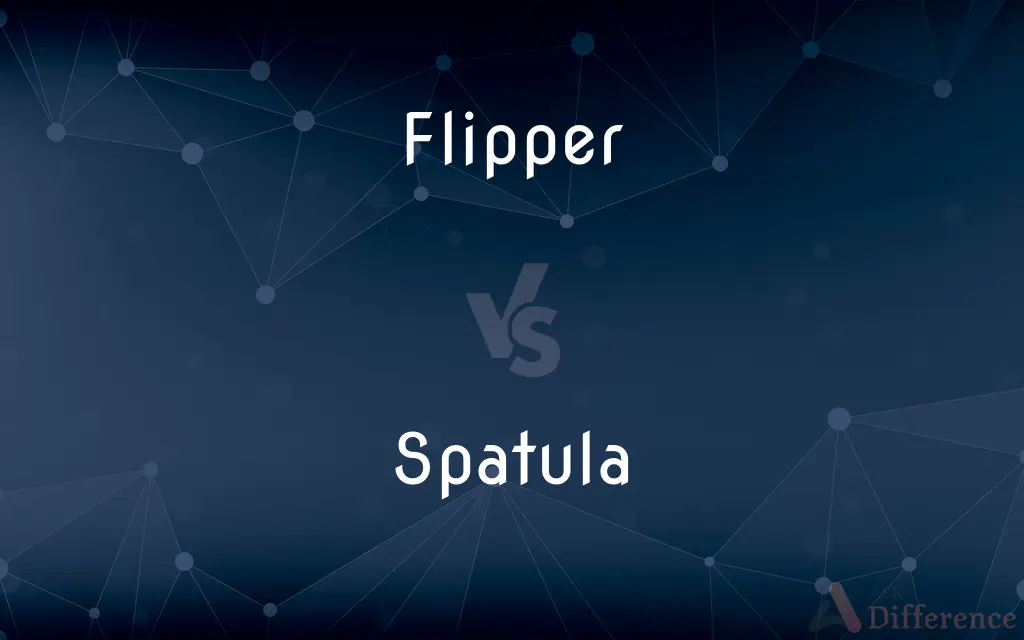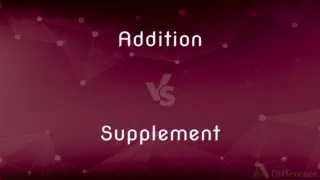Flipper vs. Spatula — What's the Difference?
By Maham Liaqat & Fiza Rafique — Updated on April 3, 2024
A flipper, designed for turning food in pans, typically has a thinner, wider surface ideal for delicate items. A spatula, though similar, can refer to various tools, including those for spreading or mixing.

Difference Between Flipper and Spatula
Table of Contents
ADVERTISEMENT
Key Differences
A flipper, often referred to as a turner, is specifically designed for sliding under food in a frying pan or griddle to flip it over without damaging it. Its design is typically thin and wide, providing the right balance of flexibility and strength for handling foods like pancakes and burgers. On the other hand, a spatula is a more general term that can describe a range of kitchen tools used for different purposes, including flipping, spreading, and sometimes even mixing. While some spatulas are designed similarly to flippers, others have a broad, flat surface ideal for spreading icing or batter.
The material of a flipper is often chosen to be gentle on cookware, with silicone or soft plastics being popular for non-stick surfaces to prevent scratching. Spatulas, depending on their specific use, may also come in similar materials but can additionally be found in metal or wood, especially when designed for tasks requiring more force or heat resistance, such as mixing or spreading dense ingredients.
Flippers are almost exclusively used during the cooking process, requiring features like heat resistance and a certain level of flexibility to maneuver under food easily. Spatulas, especially those designed for spreading or mixing, are used both in cooking and food preparation, with some types designed to handle the heat of cooking and others made for room-temperature tasks like icing a cake.
In terms of design, flippers often have a slotted or perforated surface to allow fats and liquids to drain away when lifting food out of a pan. Spatulas designed for flipping may share this feature, but those meant for mixing or spreading do not, instead having a solid surface that can effectively scrape or spread ingredients.
Despite these differences, the terms flipper and spatula are sometimes used interchangeably in casual conversation, particularly in regions where one term is more commonly used than the other. However, in a culinary context, the distinction between the two based on their intended use and design becomes more significant.
ADVERTISEMENT
Comparison Chart
Primary Use
Turning food in pans
Flipping, spreading, mixing
Design
Thin, wide, sometimes slotted
Varies: thin for flipping, broad for spreading
Material
Silicone, soft plastics for non-stick cookware
Silicone, metal, wood, depending on use
Usage Stage
Cooking
Cooking and preparation
Surface
Often slotted or perforated
Solid for spreading/mixing, sometimes slotted for flipping
Compare with Definitions
Flipper
Designed to be gentle on surfaces.
The silicone flipper was perfect for the non-stick pan.
Spatula
Comes in various materials based on use.
The metal spatula was perfect for folding the stiff dough.
Flipper
Often slotted for draining fats.
The flipper’s slots allowed the excess grease to drip off the bacon.
Spatula
Can be solid or slotted for different purposes.
She used a solid spatula for mixing and a slotted one for frying.
Flipper
Primarily used during cooking.
A sturdy flipper is essential for flipping burgers on a grill.
Spatula
Designed with specific tasks in mind.
The rubber spatula scraped every last bit of batter from the bowl.
Flipper
Tailored for maneuverability under food.
The thin edge of the flipper slid easily under the pancakes.
Spatula
A versatile kitchen tool for flipping, spreading, or mixing.
He grabbed a spatula to spread the frosting on the cake.
Flipper
A tool for turning food in pans, with a thin, wide design.
She used a flipper to carefully turn the fish in the skillet.
Spatula
Essential for both cooking and preparation.
A spatula is as useful for cooking eggs as it is for icing cakes.
Flipper
One that flips
A flipper of hamburgers.
Spatula
A spatula is a broad, flat, flexible blade used to mix, spread and lift material including foods, drugs, plaster and paints. In medical applications, "spatula" may also be used synonymously with tongue depressor.The word spatula derives from the Latin word for a flat piece of wood or splint, a diminutive form of the Latin spatha, meaning 'broadsword', and hence can also refer to a tongue depressor.
Flipper
A wide flat limb, as of a seal, whale, or other aquatic mammal, adapted for swimming.
Spatula
A small implement having a straight handle and a broad, flexible blade that is used to mix or spread semiliquid substances
Used a spatula to apply the joint compound.
Flipper
See fin1.
Spatula
A small implement having an angled handle and a broad, flat blade that is used in cooking or serving food
Flipped the pancakes with a spatula.
Flipper
A flat lever in a pinball machine, used to hit the ball so it stays in play.
Spatula
Chiefly British A tongue depressor.
Flipper
In marine mammals such as whales, a wide flat limb, adapted for swimming.
Spatula
A kitchen utensil consisting of a flat surface attached to a long handle, used for turning, lifting, or stirring food.
Flipper
A flat, wide, paddle-like rubber covering for the foot, used in swimming.
Spatula
(North America) A kitchen utensil consisting of a flexible surface attached to a long handle, used for scraping the sides of bowls.
Flipper
A flat lever in a pinball machine, triggered by the player to strike the ball and keep it in play.
Spatula
(dated) A palette knife.
Flipper
(theatre) A small flat used to support a larger one.
Spatula
(chemistry) A thin hand tool, often made of nickel, for handling chemicals or other materials, when weighing, etc.
Flipper
(cricket) A type of ball bowled by a leg spin bowler, which spins backwards and skids off the pitch with a low bounce.
Spatula
A croupier's tool for turning up cards in a casino.
Flipper
Television remote control, clicker.
Spatula
(entomology) A sclerotized, T-shaped plate in the prothorax of larvae of flies belonging to family Cecidomyiidae, the gall midges.
Flipper
The hand.
Spatula
(transitive) To lift with or as if with a spatula.
Flipper
(dentistry) A kind of false tooth, usually temporary.
Spatula
(transitive) To strike with a spatula.
Flipper
A kitchen spatula.
Spatula
An implement shaped like a knife, flat, thin, and somewhat flexible, used for spreading paints, fine plasters, drugs in compounding prescriptions, etc. Cf. Palette knife, under Palette.
Flipper
Someone who flips, in the sense of buying a house or other asset and selling it quickly for profit.
Spatula
A turner with a narrow flexible blade
Flipper
Someone who flips in any other sense, for example throwing a coin.
Spatula
A hand tool with a thin flexible blade used to mix or spread soft substances
Flipper
To lift one or both flippers out of the water and slap the surface of the water.
Flipper
A broad flat limb used for swimming, as those of seals, sea turtles, whales, etc.
Flipper
The hand.
Flipper
A shoe for swimming; the paddle-like front is an aid in swimming (especially underwater)
Flipper
The flat broad limb of aquatic animals specialized for swimming
Common Curiosities
Can a spatula be used for flipping food?
Yes, some spatulas are designed for flipping food, particularly those with a thin, flexible edge similar to a flipper.
Are flippers always slotted?
Many flippers are slotted or perforated to allow grease and liquids to drain, but some may have a solid surface depending on the design.
What distinguishes a spatula meant for spreading?
A spatula meant for spreading usually has a broad, flat surface without slots, designed to evenly distribute creams, icings, or batters.
Why do some flippers have a slotted design?
The slots allow fats and other liquids to drain away when lifting food, making the flipper more efficient for frying.
What is a flipper used for in cooking?
A flipper is used to turn or flip food items in a pan or on a griddle, ideal for delicate items that require careful handling.
How do I choose between a flipper and a spatula?
Choose based on the task: a flipper for turning food in pans, especially delicate items, and a spatula for tasks like spreading, mixing, or if it’s specifically designed for flipping.
What type of spatula is best for cake decorating?
A broad, flat spatula without slots, often made of metal or flexible plastic, is best for spreading icing smoothly on cakes.
What materials are flippers made from?
Flippers are commonly made from silicone or soft plastics, especially for use with non-stick cookware.
How should I clean my flipper or spatula?
Most flippers and spatulas, especially those made of silicone, can be cleaned in the dishwasher, but wooden ones should be washed by hand to prevent splitting.
Can metal spatulas be used on all cookware?
Metal spatulas are durable and heat-resistant but may scratch non-stick surfaces, so they're better suited for use on metal or cast-iron cookware.
What’s the best material for a spatula used in baking?
Silicone or rubber spatulas are preferred for baking, as they can scrape bowls clean and withstand mixing of thick batters.
Is a wooden spatula suitable for non-stick pans?
Yes, wooden spatulas are safe for non-stick pans as they are unlikely to scratch the surface.
Are there spatulas designed for left-handed people?
Yes, some spatulas are designed with angled handles or flexible edges that are more ergonomic for left-handed use.
Can I use a silicone flipper for high-heat cooking?
Yes, silicone flippers are heat-resistant and suitable for high-heat cooking, but always check the specific heat tolerance of the product.
Share Your Discovery

Previous Comparison
Agricultural vs. Agrarian
Next Comparison
Addition vs. SupplementAuthor Spotlight
Written by
Maham LiaqatCo-written by
Fiza RafiqueFiza Rafique is a skilled content writer at AskDifference.com, where she meticulously refines and enhances written pieces. Drawing from her vast editorial expertise, Fiza ensures clarity, accuracy, and precision in every article. Passionate about language, she continually seeks to elevate the quality of content for readers worldwide.













































